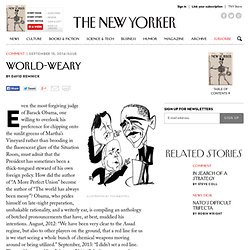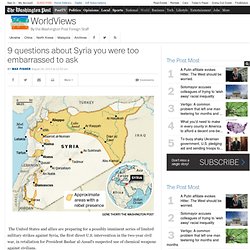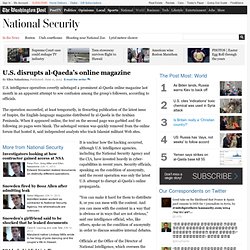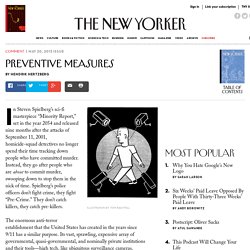

‘The Longest War’ by Peter L. Bergen - Review. By now there are already dozens of books — a few of them, groundbreaking works of reportage — about and 9/11, the wars in Afghanistan and Iraq, and the Bush and Obama administrations’ management of national security.

What makes “The Longest War,” a new book by Peter L. Rand Paul just gave one of the most important foreign policy speeches in decades. Sen.

Rand Paul just gave one of the most important speeches on foreign policy since George W. Bush declared war on Iraq. But instead of declaring war on another country, Paul declared war on his own party. Obama’s No Stupid Stuff Doctrine. Even the most forgiving judge of Barack Obama, one willing to overlook his preference for chipping onto the sunlit greens of Martha’s Vineyard rather than brooding in the fluorescent glare of the Situation Room, must admit that the President has sometimes been a thick-tongued steward of his own foreign policy.

How did the author of “A More Perfect Union” become the author of “The world has always been messy”? Obama, who prides himself on late-night preparation, unshakable rationality, and a writerly ear, is compiling an anthology of botched pronouncements that have, at best, muddied his intentions. August, 2012: “We have been very clear to the Assad regime, but also to other players on the ground, that a red line for us is we start seeing a whole bunch of chemical weapons moving around or being utilized.” September, 2013: “I didn’t set a red line. Putin is not crazy. Frustrating, unpredictable. Not crazy. President Obama has called Vladimir Putin “the bored kid in the back of the classroom,” putting on an unsmiling, tough-guy “shtick.”

Hillary Clinton just compared the Russian president to Hitler. The State Department says Putin’s reasoning on Ukraine amounts to “two plus two equals five.” Republican House Speaker Boehner branded him a “thug.” German Chancellor Angela Merkel reportedly said he is “in another world.” And George W. Putin’s decision to respond to the ouster of a pro-Moscow government in Ukraine by deploying troops across Crimea and threatening to send them into eastern Ukraine has inflamed already painful relations with the United States. He isn’t – at least not according to senior Obama aides, career military and intelligence officials, and Rep.
9 questions about Syria you were too embarrassed to ask. The United States and allies are preparing for a possibly imminent series of limited military strikes against Syria, the first direct U.S. intervention in the two-year civil war, in retaliation for President Bashar al-Assad's suspected use of chemical weapons against civilians.

If you found the above sentence kind of confusing, or aren't exactly sure why Syria is fighting a civil war, or even where Syria is located, then this is the article for you. What's happening in Syria is really important, but it can also be confusing and difficult to follow even for those of us glued to it. Here, then, are the most basic answers to your most basic questions. First, a disclaimer: Syria and its history are really complicated; this is not an exhaustive or definitive account of that entire story, just some background, written so that anyone can understand it. Bill Moyers Journal: Buying the War. U.S. disrupts al-Qaeda’s online magazine. It is unclear how the hacking occurred, although U.S. intelligence agencies, including the National Security Agency and the CIA, have invested heavily in cyber-capabilities in recent years.

Obama Narrows Scope of Counterterrorism Fight. President Barack Obama said Thursday the U.S. war against terror must seek new tactics and far-reaching revisions in the legal and moral framework that has guided policies since 2001.

While the U.S. must continue efforts to dismantle terrorist organizations and protect Americans against attack, "This war, like all wars, must end," the president said at the National Defense University. "That's what history advises. That's what our democracy demands. " Hendrik Hertzberg: Our Data-Surveillance State. In Steven Spielberg’s sci-fi masterpiece “Minority Report,” set in the year 2054 and released nine months after the attacks of September 11, 2001, homicide-squad detectives no longer spend their time tracking down people who have committed murder.

Instead, they go after people who are about to commit murder, swooping down to stop them in the nick of time. Spielberg’s police officers don’t fight crime, they fight “Pre-Crime.” Dexter Filkins: What Should Obama Do About Syria? Just after midnight on April 25th, a Syrian medical technician who calls himself Majid Daraya was sitting at home, in the city of Daraya, five miles from the outskirts of Damascus, when he heard an explosion.

He ran outside, and, on the southern horizon, he saw a blue haze. “I’ve never seen a blue explosion before,” he remembers thinking. Seconds later came another blast, and another blue haze. Majid, who used a pseudonym to protect his identity, told me that his city had become a violent and unpredictable place; for five months, it had been the scene of heavy combat between forces loyal to the regime of Bashar al-Assad and the rebels who have been fighting for more than two years to drive him from power. Rand Paul Ending Filibuster After Holder Letter. The Drone War Doctrine We Still Know Nothing About. CIA director nominee John Brennan meets with Sen.

Dianne Feinstein, D-Calif., chairwoman of the Senate Intelligence Committee, in January. (Saul Loeb/AFP/Getty Images) The focus on American citizens overshadows a far more common, and less understood, type of strike: those that do not target American citizens, Al Qaeda leaders, or, in fact, any other specific individual. In these attacks, known as “signature strikes [5],” drone operators fire on people whose identities they do not know based on evidence of suspicious behavior or other “signatures.” According to anonymously sourced media reports, such attacks on unidentified targets account for many, or even [6] most [7], drone strikes. Game of drones - Listening Post. Unmanned aerial vehicles (UAVs), better known as drones, have crept into modern warfare as quietly as the airborne killing machines themselves and, on the whole, media reporting on them has been just as subdued. Last week, the veil of silence was finally lifted when two of the most important and influential newspapers in the United States – the New York Times and the Washington Post – ran stories on a secret airbase in Saudi Arabia from which the US military has operated its 'drone war' campaign over Afghanistan, Pakistan and Yemen for the past two years.
However, as the story broke, it also came to light that reporters at both newspapers had known about the base long before the story went to print. They had agreed to conceal newsworthy information at the request of the US intelligence establishment, on the basis that reporting the truth would have harmed American national security interests. The Washington Post is also the focus of our feature story this week. U.S. said to be target of massive cyber-espionage campaign. The report, which represents the consensus view of the U.S. intelligence community, describes a wide range of sectors that have been the focus of hacking over the past five years, including energy, finance, information technology, aerospace and automotives, according to the individuals familiar with the report, who spoke on the condition of anonymity about the classified document.
The assessment does not quantify the financial impact of the espionage, but outside experts have estimated it in the tens of billions of dollars. Cyber-espionage, which was once viewed as a concern mainly by U.S. intelligence and the military, is increasingly seen as a direct threat to the nation’s economic interests. In a sign of such concerns, the Obama administration is seeking ways to counter the online theft of trade secrets, according to officials.
China has staunchly rejected such allegations, saying the Beijing government neither condones nor carries out computer hacking. U.S. Confronts Cyber-Cold War With China. The Future Issue - An FP Special Report. Meet ‘Comment Crew,’ China’s Military Hackers. When the New York Times reported last month that hackers had infiltrated its computer systems, it was pretty sure they were with the Chinese military, but beyond that it didn't really identify them. That changed on Monday night, when the Times ran a massive report tracing the hackers to a building outside Shanghai, which houses Unit 61398 of the People's Liberation Army. That unit is thought to house the hacking outfit known in computer security circles as "Comment Crew" or "Shanghai Group," thought to be responsible for much of China's alleged cyber-attacks since 2006. Fuzzing to find a zero day.
At just 5 ounces and 4 1/2 inches long, the iPhone is an elegant computing powerhouse. Its microscopic transistors and millions of lines of code enable owners to make calls, send e-mail, take photos, listen to music, play games and conduct business, almost simultaneously. Nearly 200 million iPhones have been sold around the world. The idea of a former cyberwarrior using his talents to hack a wildly popular consumer device might seem like a lark. But his campaign, aimed at winning a little-known hacker contest last year, points to a paradox of our digital age. The same code that unleashed a communications revolution has also created profound vulnerabilities for societies that depend on code for national security and economic survival. Domestic Propaganda and the News Media: 'Mission Accomplished' Olbermann's New Anti-War Signoff Mocks "Mission Accomplished" Eight Years Ago, Bush Declared 'Mission Accomplished' in Iraq - National.
Today marks the eighth anniversary of Bush's "Mission Accomplished" speech about the Iraq War, when American casualties stood at 139 killed and 542 wounded. Eight years, over 4,000 U.S. fatalities, and hundreds of thousands Iraqi fatalities later, the war carries on. In 2008, U.S. President George W. The Future of History. Hillary Clinton's Remarks at Foreign Policy's 'Transformational Trends' Forum. Inside a U.S. Embassy. Cuban Missile Crisis. Timeline. Judge Rules Memo on Targeted Killing Can Remain Secret. Report: U.S. Drafting a Drone Strike Rulebook. The New York Times reports that the White House has finally decided to come up with some "explicit rules for the targeted killing of terrorists by unmanned ," which is something that does not yet exist even though at least 2,500 people have been killed by remote-controlled CIA and military strikes since President Obama took office.
Taxi to the Dark Side. Supporting US Foreign Policy in the Post-9/11 World. Policymakers and the Intelligence Community. Teaching foreign policy with film. The Fog of War. Cuban Missile Crisis - John F. Kennedy Presidential Library & Museum. The Cuban Missile Crisis, 1962: A Political Perspective After 40 Years. Cuban Missile Crisis. Eisenhower's Warning Still Challenges A Nation.
Eisenhower's Military-Industry Complex Warning, 50 Years Later. John F. Kennedy: Inaugural Address. U.S. Inaugural Addresses. 1989. Transcript of President Dwight D. Eisenhower's Farewell Address (1961) Todd S. Purdum on National Security. Rise to Globalism. Military power of NATO and the Warsaw Pact states in 1973.svg - Wikipedia, the free encyclopedia. Iran, the United States and a Nuclear Seesaw - Interactive Feature.
Falling In and Out of War. One World, Rival Theories - By Jack Snyder. The Word - Due or Die - The Colbert Report - 2012-06-03. Robert Kagan on Why the World Needs America. Obama’s Theme of U.S. Resilience Finds Support in New Book. In Kim Jong-il Death, an Extensive Intelligence Failure. America Really Was That Great - By Thomas L. Friedman and Michael Mandelbaum. The Vietnam War, Still Haunting Obama. ‘Top Secret America’: A look at the military’s Joint Special Operations Command. William C. Martel: I hope it’s not a return to ‘Charlie Wilson’s War’ William C. Martel: After 9/11, division and resilience.